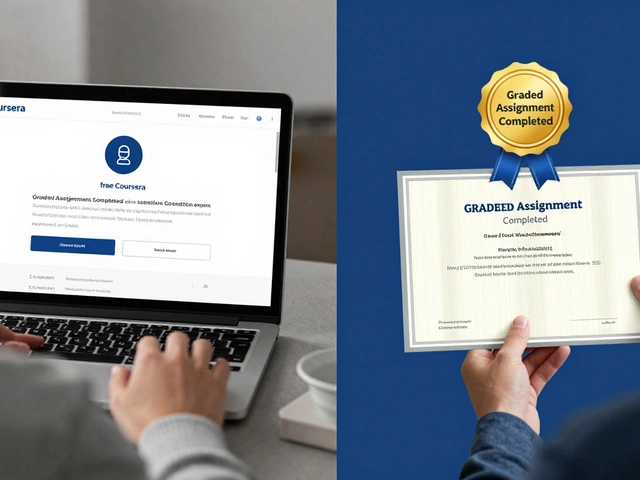Education in India is a vast and diverse landscape, with numerous boards catering to the academic needs of millions of students. Among these, the Central Board of Secondary Education (CBSE) often emerges as a popular choice. But what really sets it apart? Many are keen to know if it's the most accessible option out there.
In this article, we dive into the heart of the CBSE syllabus, exploring its structure and why it's deemed straightforward by many. We'll look at how it stacks up against other boards in India and at the benefits it brings to students. By shedding light on these aspects, this piece aims to help parents and students choose a path that's right for them.
- Understanding the CBSE Board
- Comparison with Other Indian Boards
- Advantages of the CBSE Syllabus
- Tips for Navigating the CBSE Curriculum
Understanding the CBSE Board
The Central Board of Secondary Education, more commonly known as CBSE, is one of India's most prominent educational boards. Established in 1962, CBSE operates under the government of India and caters to both public and private schools, offering a robust and uniform curriculum. As of the last count, there are over 21,000 schools in India alone affiliated with CBSE, including approximately 220 institutions in foreign nations, which showcases its expansive reach.
CBSE's curriculum is designed to provide a standardized education across various regions in India, which makes it a preferred choice for families that relocate frequently. The board is committed to modern educational practices and emphasizes critical thinking as a core part of its syllabus. The curriculum is structured to minimize rote learning and focus more on understanding concepts, making it both relevant and engaging for students. A distinctive feature of the CBSE board is its focus on Science and Mathematics, although other subjects are also well catered for.
One of the advantages of the CBSE syllabus is its alignment with various competitive examinations such as IIT-JEE and NEET. Since a large portion of these exams' syllabi overlaps with what CBSE covers, students often find themselves better prepared for these pivotal tests if they have gone through the CBSE system. In addition, the board conducts two primary public examinations: the All India Secondary School Examination for Class 10 and the All India Senior School Certificate Examination for Class 12, both serving as crucial academic milestones.
The instructional language in CBSE-affiliated schools is primarily English and Hindi, though English is predominantly used, which helps with higher education and career opportunities globally. Recently, the board has also integrated vocational subjects into the curriculum, providing practical knowledge and skills. CBSE's emphasis on extracurricular activities contributes to the holistic development of students. With a flexible structure, it allows students to pursue their interests and hobbies alongside academic learning.
According to a recent educational study: "CBSE’s emphasis on understanding concepts rather than memorizing them, prepares students well for the challenges of higher education and beyond."Adopting tech-savvy approaches, CBSE offers digital learning resources and has launched several online initiatives. These efforts reflect its forward-thinking philosophy, aiming to keep pace with global educational standards. For parents and students considering the CBSE board, embracing these features can pave the way for a comprehensive educational journey, promising not just academic success but also overall growth and development.

Comparison with Other Indian Boards
The Indian education system comprises various boards, each with its own unique framework and philosophy towards learning. Yet, the Central Board of Secondary Education (CBSE) frequently finds itself compared to other major players, such as the Indian Certificate of Secondary Education (ICSE) and state boards like Maharashtra and Tamil Nadu. As parents and students initiate their quest to identify the most suitable educational board, understanding these differences becomes essential.
Introduced in 1962, the CBSE syllabus is viewed as more Centralized and uniform, spreading across Indian borders into 24 other countries, offering international exposure and adaptability. In contrast, ICSE is famed for its rigorous curriculum and a broader spectrum of subjects, but it often demands more from students in terms of workload and study hours. This makes CBSE appealing with its leaner textbook demand and a curriculum designed to mitigate student stress. Meanwhile, state boards consistently localize their syllabi to focus on regional languages and contexts, a factor worth considering for families with specific linguistic or cultural priorities.
The Merit Status in Three Boards
| Board | Characteristics | Reach |
|---|---|---|
| CBSE | Nationalized, uniform, focus on Maths & Science | Indian and overseas |
| ICSE | Broad curriculum, extensive subject selection | India, recognized abroad |
| State Boards | Localized, language/culture centered | State-centric, India |
Parents have realized that CBSE often paves a clearer path towards competitive exams and national eligibility tests, given its challenging Math and Science alignment." Undoubtedly, it sets CBSE apart from ICSE, which tends to focus on language proficiency and arts with extreme precision.
The choice often boils down to a family's ambition and the child's learning style. Suppose an international horizon beckons, or a laser-sharp focus on cracking IIT and AIPMT exams. In those cases, CBSE emerges as a natural favorite. Conversely, the state boards frequently clinch an advantage with their local focus, ideal for students integrating into regional academia or institutions. Parents must often deliberate whether an 'easy' board, synonymous with flexibility and availability, takes precedence over a curriculum meant to rigorously test a child's diverse competencies, as seen with ICSE. Thus, understanding these subtleties provides a clearer picture, equipping families with the information needed to choose the best-suited educational path.

Advantages of the CBSE Syllabus
When we talk about the CBSE syllabus, its clear intention to form a robust educational base is prominent. With a curriculum designed to encourage analytical thinking, CBSE focuses on building a strong foundation in mathematics and science right from the primary level. This approach enables students to develop problem-solving skills, which become crucial in higher academic pursuits and real-life situations. Unlike other boards which might prioritize rote learning, CBSE fosters a learning environment that promotes understanding and retention of knowledge. While the emphasis on a strong theoretical foundation remains, an increasing number of schools are integrating hands-on projects and activities that complement bookish learning.
CBSE has made a strategic shift towards a competency-based learning approach which emphasizes critical and creative thinking. — Times of India
Students enrolled under the CBSE board often express satisfaction with the wide array of academic resources available. There are numerous reference books, both in print and digital formats, designed specifically for CBSE students. These resources complement textbooks and offer a variety of practice questions and illustrative examples to consolidate their learning. Those who wish to clarify doubts independently often find these supplementary materials invaluable as they provide ample content for self-study. Additionally, the CBSE board examinations have a national recognition, making them advantageous for parents who frequently relocate within India, as CBSE-affiliated schools are widespread and follow a standardized curriculum.
To determine whether CBSE is the best fit for your child, consider the structure of assessments and exams. Known for its consistent examination pattern, CBSE ensures that all students across India face exams with a similar set of questions, ensuring fairness. The grading system, which is pivotal in preparing students for higher studies, rewards both learning and application. Regularly updated syllabi keep in tune with global educational trends, ensuring students have access to the latest knowledge breakthroughs. For those aspiring to compete in national entrance tests like the IIT-JEE or NEET, the CBSE syllabus provides comprehensive content coverage as these exams also adhere mostly to CBSE patterns.
The flexibility in language selection can also be seen as a distinct advantage of the CBSE syllabus. While English is the primary medium, students can choose from a spectrum of regional languages as a second language, enabling them to gain proficiency in vernacular languages. This flexibility not only bolsters their language skills but also connects students to their cultural roots. While English-medium education is largely emphasized, preserving linguistic diversity provides students a holistic educational experience.
There is another dimension of the CBSE board that parents should consider - its alignment with international educational standards. The National Council of Educational Research and Training (NCERT) advises on curriculum development, making it globally competitive. CBSE standards frequently benchmarked against other international curricula ensure the syllabus stays contemporary and research-oriented. For families aiming for global schooling or college education, CBSE offers a preparatory edge, being acknowledged by numerous foreign institutions. Hence, pursuing CBSE education could be a strategic choice for families contemplating overseas education opportunities.

Tips for Navigating the CBSE Curriculum
Embarking on the journey through the CBSE syllabus can sometimes feel daunting, but with the right guidance, it can be a smooth sail. One key aspect to successfully navigating this curriculum is understanding its structure. The CBSE is known for its extensive yet organized path, focusing on integrating a well-rounded education that balances both academic and co-curricular activities. Familiarizing oneself with the subject chapters and topics can help students develop a strategic study plan that covers all necessary parts without cramming. Moreover, using the detailed textbooks prescribed by the CBSE board can be beneficial as they are designed to clarify concepts with a mix of examples, exercises, and summaries.
Adopting proper time management skills is crucial throughout the academic year. Crafting a study timetable that allocates specific time slots for each subject can ensure comprehensive coverage of the syllabus. It is wise to start with subjects that the student finds challenging and gradually move to those that are easier. This habit not only boosts confidence but also ensures that students are not overwhelmed by difficult topics at the last minute. Incorporating breaks and recreational activities into the schedule is equally important to maintain a balanced mind and thwart burnout. Remember, consistent study habits often outperform last-minute cramming, which is a common pitfall for many students.
Practice plays a pivotal role, especially when preparing for board exams. Solving past year papers and sample papers can provide valuable insights into the exam pattern and frequently asked questions. This practice not only strengthens the knowledge base but also helps in time management during exams. Students should aim to solve these papers within a stipulated time, simulating the actual exam environment. This exercise increases speed, reduces anxiety, and helps identify areas that need further revision. Additionally, CBSE often emphasizes understanding concepts rather than rote learning, so engaging in discussions with peers or teachers can enhance comprehension and retention.
Leveraging technology can also be incredibly beneficial. There is a plethora of online resources, including educational apps and websites that offer video lectures, quizzes, and interactive lessons on various CBSE topics. Many of these platforms are designed to make learning engaging and are aligned with the CBSE syllabus. Tools like flashcards can aid in memorizing important points or jargon. Furthermore, joining online communities or forums can connect students with peers tackling similar challenges, fostering a supportive learning environment. As the saying goes, "Learning never exhausts the mind," and technology can indeed make this journey exciting and fruitful.
"Education is not the learning of facts, but the training of the mind to think." - Albert Einstein
Lastly, maintaining a positive attitude towards education and exams can drastically improve a student's experience with the CBSE board. Stress and anxiety are common hurdles, but relaxation techniques such as meditation or yoga can promote mental well-being. Encouraging open communication between students, parents, and teachers can create an empathetic support system that reassures students during tough times. Understanding that exams are just one part of a broader learning journey can help alleviate undue pressure, thereby allowing students to focus on personal growth and learning.




